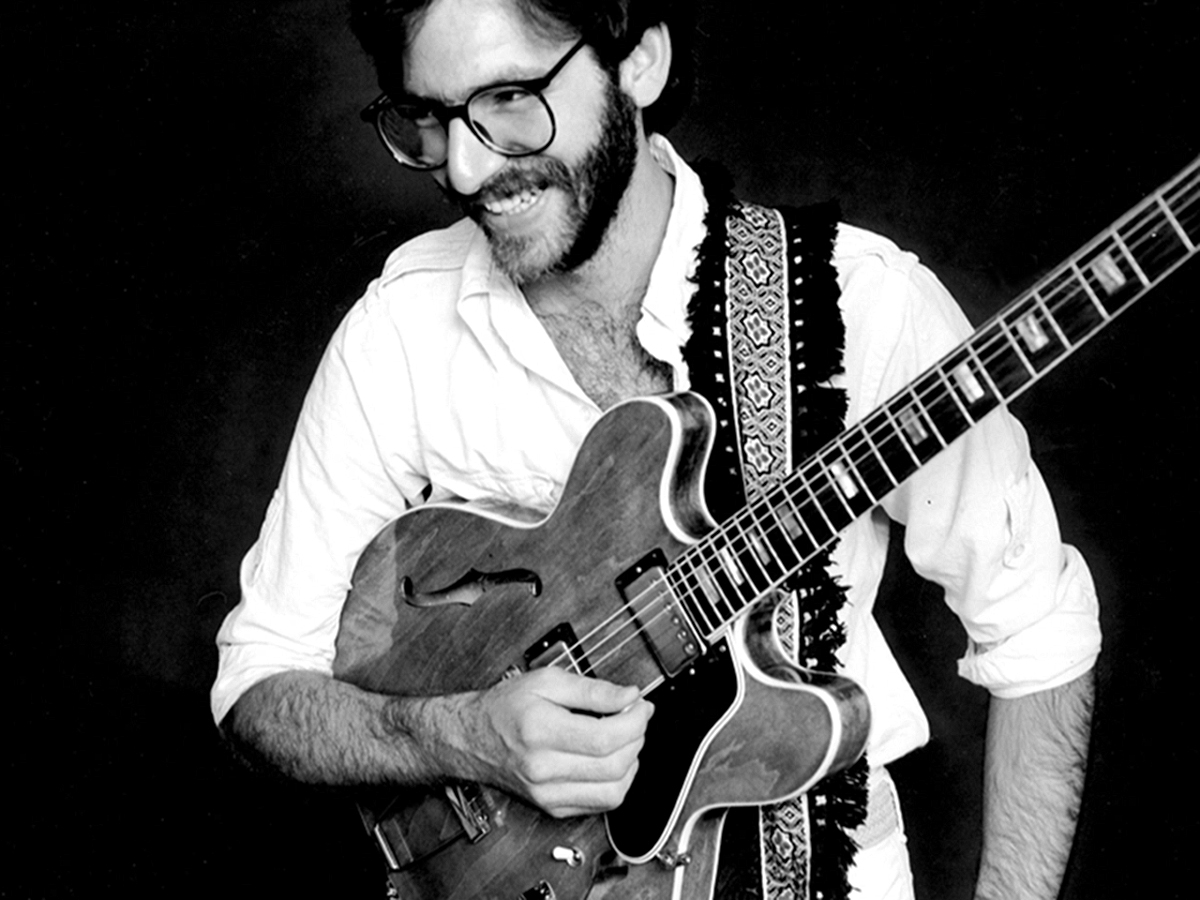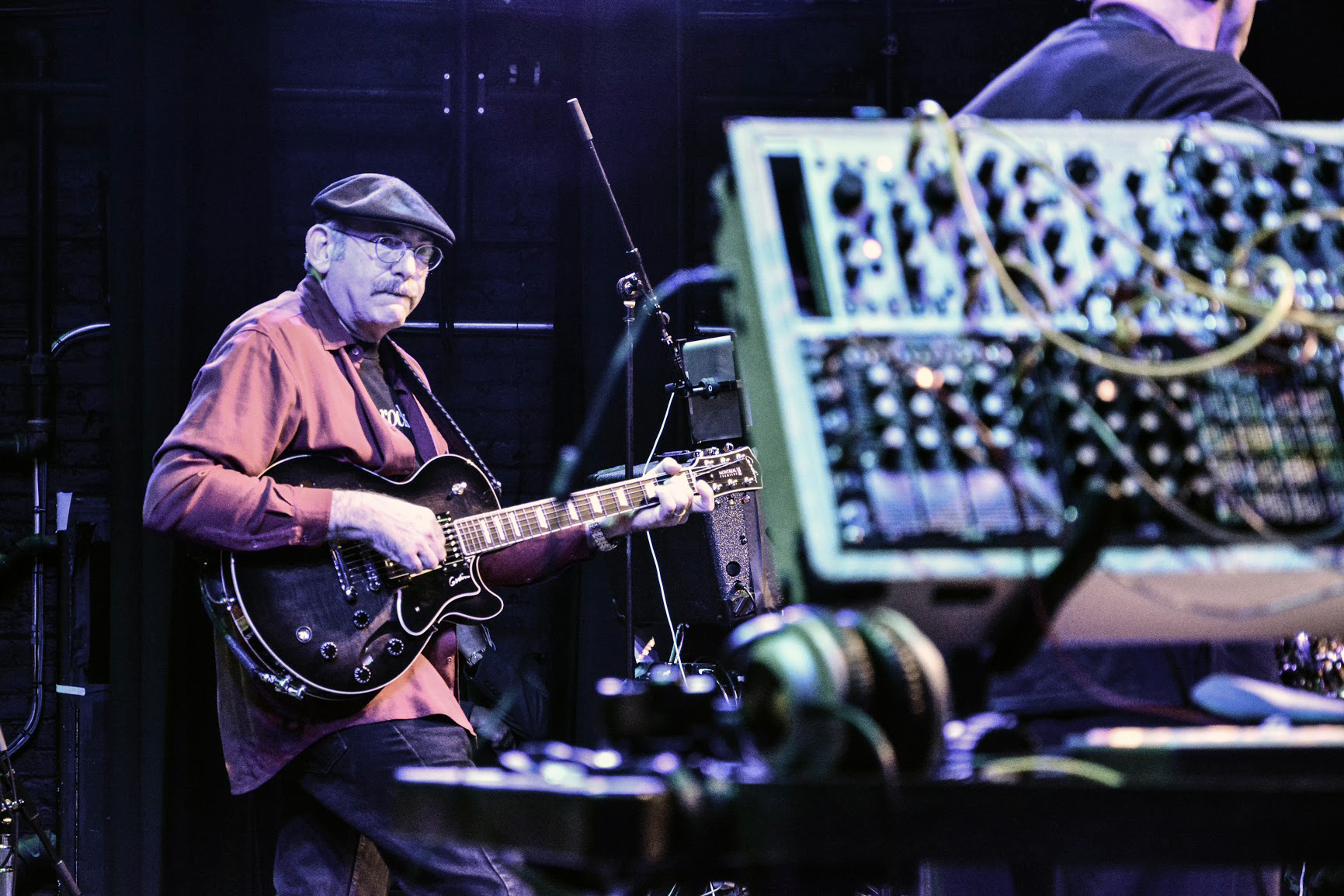Four Decades of Defining Berklee’s Future

David Mash as a guitarist in the 1970s in his pre-music technology days.
Now, Mash is retiring. He was recently honored at Berklee’s Voltage Connect Conference and Concert, sponsored by the college’s Electronic Production and Design (EPD) Department. EPD is the successor to the Music Synthesis Department, which Mash founded, and which was the first college-level program to focus on the MIDI technology that now drives the modern music industry. Leading up to the conference, many of his closest colleagues came to celebrate Mash’s lasting influence at an event in Berklee’s David Friend Recital Hall.
Scott Street, Berklee’s now-retired associate vice president for information technology, described Mash as a “visionary, improviser, entrepreneur, relationship builder, passionate leader and shaper of Berklee, and the best boss I ever had.”
Street was one of many to cite the impact Mash had on his life. When Lee Whitmore, vice president for education outreach and social entrepreneurship, asked, “How many of you have had David, in some way, touch and change your life?” every person in the hall raised their hand, which is no wonder when one considers the remarkable scope of Mash’s work.
Curiosity Saved the Jazz Cat
Growing up in a musical family in Detroit, Mash took to the guitar early and received guitar lessons from a well-respected local instructor, Joe Fava, starting at age seven. Playing in wedding and bar mitzvah bands throughout high school, Mash was also drawn to art, though, perhaps due to his color blindness, he found that the artwork that most resonated with him did not have the same impact on most others, and vice versa.
Partially at the behest of his parents, who loved music but did not consider it a serious profession, Mash set out to be a doctor, undertaking his pre-med work at Oakland University. But after he realized during a dissection exercise that he was uncomfortable at the sight of blood, Mash knew that plan A wasn’t going to work for him. He changed gears and decided to study music at Wayne State University in Detroit, where he reconnected with his original teacher, Fava.
“I placed out of all the music theory courses because I’d been studying all my life, basically,” Mash says, and before long, Fava told him, “’You should be pursuing something beyond this.’”
Fava advised Mash to explore Berklee to advance his musicianship as a guitarist, and Mash followed his advice, first studying via Berklee’s by-mail correspondence course in 1972 (an analog precursor, in many ways, to the distance learning curriculum of Berklee Online today). He then enrolled as a full-time student on campus in 1973 before graduating summa cum laude in 1976. Mash points to faculty mentors such as Michael Rendish, Herb Pomeroy, Mike Gibbs, Larry Monroe, Ted Pease, and Alex Ulanowsky as particularly influential in his development as a musician and as a person during his student days at Berklee.
By 1976, Mash and his progressive electronic-jazz fusion band, Ictus, began building what became a solid following. Mash has always played and composed at a high level but, in a cruel twist of fate, he lost the use of his right hand due to a surgical error in 1977.
Not one to give up or give in and in true jazz cat fashion, Mash soon figured out how to adapt to his new physical limitation and began playing an instrument that was new, both to him and to the world at large: the synthesizer. Playing with one hand, Mash was able to continue recording and performing with the band, which enjoyed a successful run until 1983, and Mash has continued to compose and record complex yet accessible pieces under his Mashine Music moniker ever since. “I need to play music every day,” Mash says “to stay connected to who I am as a human being.”
Moving to the synthesizer launched Mash’s lifelong interest in electronic instruments. That instinctive curiosity about new technology has served Mash well; it led him to become one of the original AppleMasters, the select group who used, tested, and generally amplified the proliferation of early Macintosh computers, which remain Berklee’s most ubiquitous technological device to this day. It also led him to accept consulting work for leading companies such as Korg, Roland, Yamaha, Kurzweil, and Adobe, among others.
Mash attributes his success with technology to being a lifelong student regarding music, education, and technology, as well as to his decades of exposure to a wealth of creative influences at Berklee. “The students and faculty here are amazingly talented, and they’re all passionate about creating new work that will inspire all of us,” Mash says. “I think that’s what makes this place unique on the planet.”
Leading with Altruism

David Mash onstage in the Berklee Performance Center. Mash is looking forward to writing, recording, and performing his music in his retirement.
On a more public stage, he harnessed his knowledge of technology, music, and education to build out the Berklee City Music program from a Boston-based initiative to a network of more than 40 community-based organizations across the United States and Canada, providing high-quality contemporary music instruction via the Berklee PULSE music method to youth from underserved communities—including 60,000 students in New York City alone.
In reflecting on his career, Mash says, “That’s one of the most gratifying things—when an idea that you had that started small got adopted by enough people to make it be something big.”
At ease with discussing big ideas, Mash was the natural choice to be the driving force behind Berklee’s vision for 2025, which is serving as the North Star in Berklee’s current strategic planning process. However, Mash takes less pride in the end result, however, than he does in the process; in this case, that process included a series of town hall meetings that brought the full Berklee community together to collaborate on creating the institution’s vision.
“It’s amazing what you can accomplish when you don’t need to take credit,” Mash says, citing a fortune cookie message he once received that he has since concluded is one of life’s great truisms. Its a message that has allowed him to lead from a place of altruism and to inspire those around him to trust him with the freedom to color outside the lines.
The House That Mash Built
Whether Mash wants the credit or not, Berklee president Roger Brown was quick to dispense it at the farewell soiree for Mash. “We’re going to miss you,” Brown said. “When I got to Berklee, David was one of the people I learned the most from because he had a unique way of understanding and honoring the history of the place without being trapped by the history.”
After Brown concluded his remarks, Mash stepped to the stage in the David Friend Recital Hall to share a few words of wisdom gleaned over the course of his four decades at Berklee as his wife, Erica Mash, looked on, accompanied by their children and grandchildren.
With an emotional quiver in his usually sturdy bass voice, Mash concluded, “I’m just really happy to have been here.”
While it felt like a bittersweet ending, for Mash, it is also the beginning of a new chapter—one in which he plans to write and play a lot of music that he hasn’t had enough time to finish, write new courses for Berklee Online, and develop an outstanding-sounding MIDI classical guitar effect.
After 40 years at Berklee, Mash says, “I’ve cherished the relationships above everything. I’ll miss the interaction with so many great thinkers and artists, and I hope I can maintain those connections.”
While looking back upon a career well spent comes with a sense of nostalgia, as a futurist, there remains an unmistakable twinkle in Mash’s eye as he contemplates what lies ahead for himself and for Berklee.
“There’s no limit to the number of great ideas that people could bring forth,” Mash says. “The best way to invent the future is to build it.”
Over the decades and in myriad ways, that work—the work of building the future at Berklee—seems sure to be Mash’s legacy, and the future looks bright.
A video interview with David Mash is available via the Stan Getz Library’s Berklee Oral History Project initiative. An abridged version of the interview is available via the Inside Berklee PODCAST.
Mike Keefe-Feldman is a senior writer and editor in Berklee’s Strategy and Communications Department




